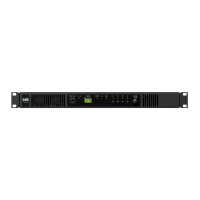TB7100 Service Manual Frequency Synthesizer Fault Finding 143
© Tait Electronics Limited October 2005
11 Frequency Synthesizer Fault Finding
Introduction This section covers the diagnosis of faults in the frequency synthesizer.
The sections are divided into the following:
■ Initial checks
■ Fault diagnosis of RF PLL circuitry
■ Fault diagnosis of FCL circuitry
The initial checks will indicate whether it is the RF PLL or the FCL that is
suspect. Note that the synthesizer is a closed-loop control system. A fault in
one area can cause symptoms to appear elsewhere. Locating the fault can
therefore be difficult.
Measurement
Techniques
The radio must be in CCTM for all the fault-diagnosis procedures of this
section. The CCTM commands required are listed in Table 11.1.
Full details of the commands are given in “Computer-Controlled Test
Mode (CCTM)” on page 91. Use an oscilloscope with a x10 probe for all
voltage measurements required. The signals should appear stable and clean.
Consider any noise or unidentified oscillations as evidence of a fault
requiring investigation. Use a frequency counter for all measurements of
high frequencies. The RF power output from the frequency synthesizer will
not exceed 10mW. If a probe is used for frequency measurements, use the
x1 setting.
Table 11.1 CCTM commands required for the diagnosis of faults in the frequency synthesizer
Command Description
72
101 x y 0
205
301 0 10
302 0 10
334 x
335 x
389 x
393 1 x
Read lock status of RF PLL, FCL and LO2 — displays xyz (0=not in lock, 1=in lock)
Set transmit frequency (x in hertz) and receive frequency (y in hertz) to specified values
Reset calibration parameters to their default values
Calibrate VCXO of FCL
Calibrate VCO(s) of RF PLL
Set synthesizer on (x=1) or off (x=0) via DIG SYN EN line
Set transmit-receive switch on (x=1) or off (x=0) via DIG SYN TR SW line
Set synthesizer mode to slow (x=0) or fast (x=1)
Write data x to FPGA

